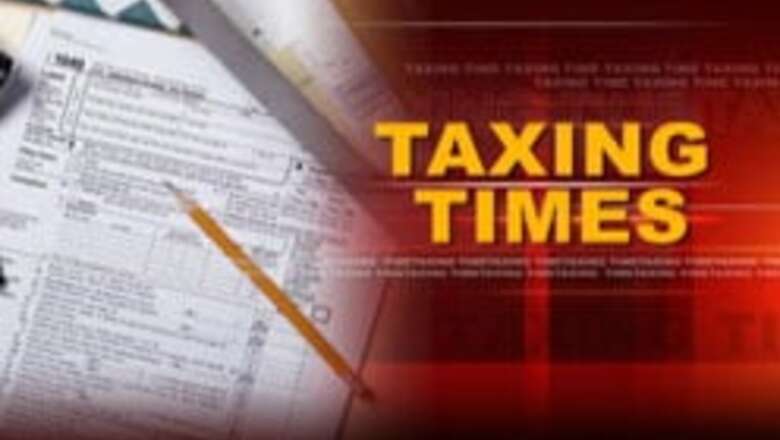
views
New Delhi: With the deadline to filling your Saral form and filing your I-T returns approaching, here are a few tips that will make sure that you are well prepared for the D Day.
These are taxing times for all salaried individuals, who need to file their Income Tax returns by July 31. In an exclusive chat with CNN-IBN, tax guru Subhash Lakhotia demystifies the Saral form.
Here are some frequently asked questions and their answers.
What if the assessee does not have a Permanant Account Number (PAN) at the time of filing the return?
If the assessee does not have a PAN number, he should still fill up his application and should enclose a copy of the application fro PAN and should just write in the form 'Applied for and not yet alloted'.
What if the assessee submits an incorrect PAN?
Please try and submit the correct PAN. That's the basic information needed to make correct your return and place it in the proper shelf.
If you make the mistake, don't worry and file your return again quoting the correct PAN. Otherwise you can write a letter to the assessing officer giving details of the return filed, the date and the receipt number and quoting the correct PAN.
Column 11 talks of the 'Assessment Year'. What is the Assessment Year? Is it the financial year?
The Assessment Year is the year ahead of the financial year. For example the the assessment year for this return will be 2006-2007.
On the other hand, the financial year - the time for which tax is being paid - will start on April 1, 2005 and close on March 31, 2006
Column 12 asks an assessee to mark whether this is an original return or a revised one. What is the difference between the two?
When you file your return for the first time this year, then write Original Return. If you have committed a mistake in filing the returns and you revise your return, only then will you write Revised Return.
Section 15 onwards is the trickier portion of the form. A lot of people are clueless on Column 18, which asks about Capital Gains. What all is included in Capital Gains?
Profit earned on selling capital assets like land, building, jewellery, shares and mutual funds are called Capital Gains. The profit shown here should net figures that is income minus losses.
Column 18 has three sub columns. In Column 18 A, we are required to mention capital gains by way of short-term capital gains, which is going to suffer tax only at 10 per cent that is in respect of securities liisted in the stock market.
Column 18 B is again short-term capital gain, which is for gains where the tax payable becomes 30 per cent.
PAGE_BREAK
Column 18 C refers to long-term capital gains where the assessee will mention all the sources of income.
Column 19 talks about income from other sources. What are these sources?
Before coming to Column 19, the assessee should remember to fill up the columns concering incomes from salary, house property, business and capital gains correctly.
The income from other sources mentioned in Column 19 may be the following:
- Interest from banks - bank savings and fixed deposits.
- Interest from National Saving Certificate.
- Interest from Kisan Vikas Patra.
Column 20 talks about income of any other person to be added. What all does this include?
This column should include only those incomes which are required to be clubbed with the income of the assessee. This includes income arising directly or indirectly to a spouse as a result of transfer from the husband.
Do not include your wife's salary here. However, if there is income arising from a gift by the spouse, include it here. Similarly, add income arising from minor children.
Column 22 talks about deductions under chapter 6A. What are these deductions?
Chapter 6A actually works towards reducing the assessee's tax payment. The deductions include:
- Investments like Provident Fund, PPF, repayment of housing loans, children's education fee and insurance - all together should maximum to upto Rs 1 lakh under Section 80 C.
- Then there are other deductions like pension plan investments.
- Mediclaim Premium upto Rs 10,000 under Section 80 D
- Interest On education loans upto Rs 20,000 under Section 80 E. This deduction is not available to the persons taking loans for education of their children. This is applicable only if the assessee has taken a loan for his own education - unlimited amount interest on loan for your education.
Column 25 asks for the income claimed to be exempted from Income Tax. What kinds of income fall under this category?
No tax is payable on the incomes that are quoted here. These are items that are fully exempt for example:
PAGE_BREAK
- Income from dividends
- Income from mutual funds
- Interest from Post Office savings account
- Income from 6.5 per cent savings bonds of the RBI, which incidentally are not available now.
Here the income has been declared but is exempt from tax.
Then there is column 27, which talks of rebates under various sections. Are they relevant?
Please remember that this year there is no rebate available and therefore the Rebates Column is redundant because the Government has not amended the form this year.
Who all are required to file returns?
Everyone who's gross income (without deductions) is within the tax bracket is required to file their income tax returns.
Where all can the assessee submit his returns?
Returns can be submitted at the Income Tax office or post offices.
What all documents should be attached along with Form 2D?
The following documents need to be attached with Form 2D:
- A salary certificate which is also called Form 16
- Proof of interest on housing
- Proof regarding investments made for tax deductions.
Once the tax liability or the amount of refund has been calculated, should the returns be filed and people wait for the Income Tax department to send a challan or refund?
Do not wait for the tax challan. Pay it yourself before the due date.
What happens if the deadline for filing the return is missed? Is there a penalty?
There is a penal interest at the rate of 1 per cent (of the tax payable) per month that must be paid in case the deadline is missed.




















Comments
0 comment